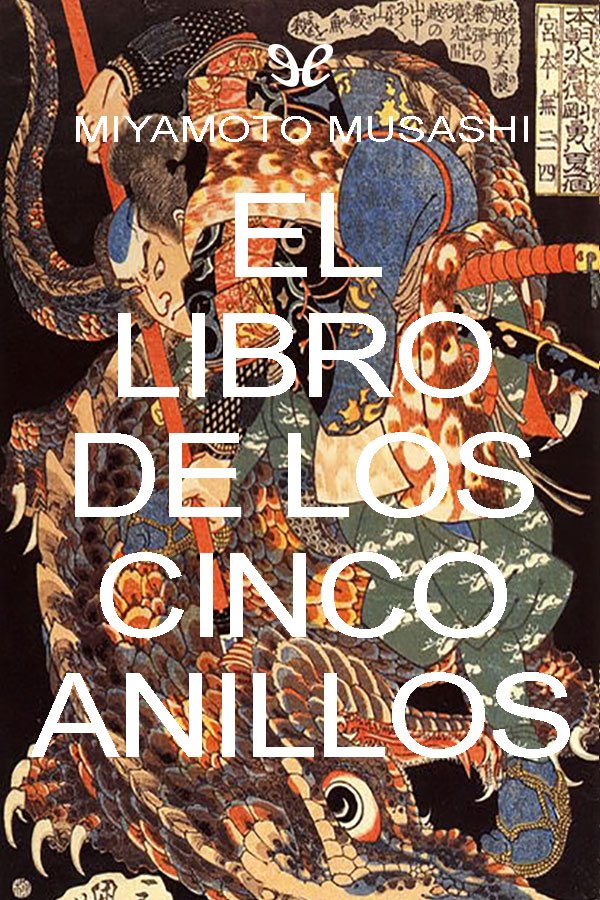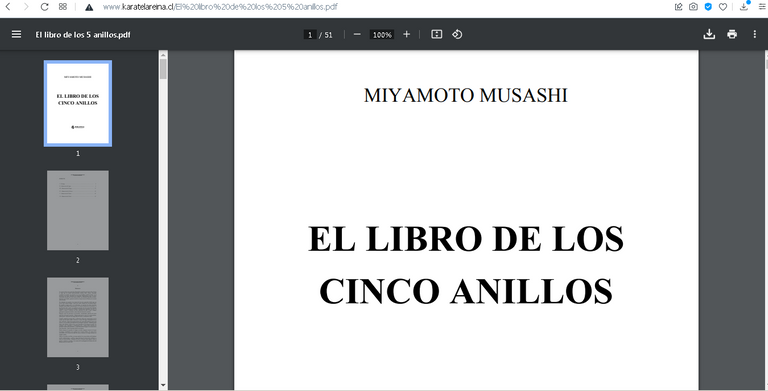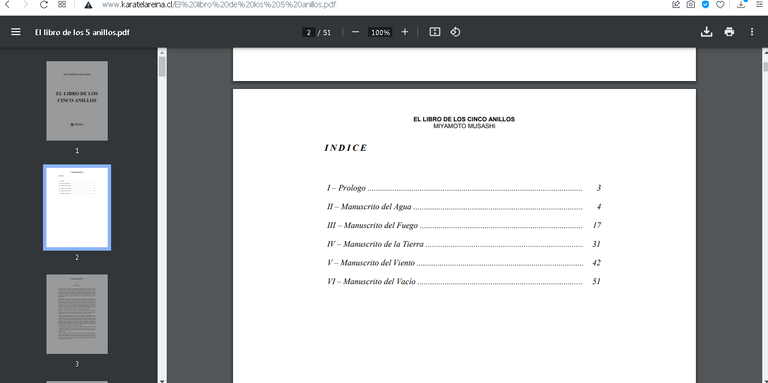[ENG - ESP] The book of the 5 rings by Miyamoto Musashi: Sharpen your mind and spirit like a sword (Review)


At the end of August I had the opportunity to download and read a book, which for some time has caught my attention, being in comparative terms a version of the world famous art of war by Sun Tzu but in this case being a Japanese version, and I say this because the content of this particular book, one could say that it is based on being a treatise of preparation for war conflicts with some differences, and those differences are linked to the context of how and by whom it was written and their lifestyle.
The figure in question behind this book is the famous warrior known as Miyamoto Musashi, a remarkable figure in Japanese culture and society, who lived a life immersed in battles and combats, combats of which it is said that there were 60 as such in which he came out completely victorious. Taking from his experiences at the end of his life he decided to compile a treatise that from his position invites us as readers, to place ourselves from his perspective as samurai or swordsmen, and from such teachings extrapolate them also to our convenience, that knowledge marked in other aspects of our life.
So it will be a pleasure for me to talk a little more in detail in this post, about this particular figure and the impact he left on me and how this is currently received in society mainly in Japan, also making a small comparison in more detail a little later of the notable differences between this book and the art of war, without more to say let's begin.
A finales de Agosto tuve la oportunidad de descargarme y leerme un libro, que desde hace un tiempo me ha llamado la atención, siendo en términos comparativos una versión del mundialmente conocido arte de la guerra de Sun Tzu pero en este caso siendo una versión japonesa, y digo esto porque el contenido de este libro en particular, se podría decir que está basado en ser un tratado de preparación ante conflictos bélicos con algunas diferencias, y esas diferencias radican en estar ligadas al contexto de cómo y por quien fue escrito y su estilo de vida.
La figura en cuestión detrás de este libro es el famoso guerrero conocido como Miyamoto Musashi, un figura destacable en la cultura y sociedad japonesa, el cual vivió un vida inmiscuida en batallas y combates, combates de los cuales se dice que fueron 60 como tal en los cuales este salió completamente victorioso. Tomando de sus experiencias a los finales de su vida decidió recopilar un tratado que desde su postura nos invita a nosotros como lectores, a colocarnos desde su perspectiva como samuráis o espadachines, y de tales enseñanzas extrapolarlas también a nuestra conveniencia, ese conocimiento marcado en otros aspectos de nuestra vida.
Así que será un placer para mi hablar un poco más a detalle en este post, sobre esta figura en particular y el impacto que dejo en mi y como este es recibido actualmente en la sociedad principalmente en Japón, haciendo también una pequeña comparación más detallada un poco mas adelante de las diferencias notables, entre este libro y el arte de la guerra, sin más que decir comencemos.


About the author / Sobre el autor
Miyamoto Musashi (1584 - 1645) was a warrior in a time of feudal Japan, who followed from an early age the way of the warrior, gifted with considerable skill in the handling of the sword and the use of it. And with this in place he polished his skill by putting it to the test, traveling throughout the country and fighting with famous swordsmen or samurai of his time, the impressive thing about this feat is that Musashi throughout his life it is estimated that he won a total of 60 duels in total, and they were not friendly duels, they were to death considering the statutes of that time and the way or form in how this required them or simply prepared in their day to day to accept it. Having an older age, he decides to capture his experiences in this manual in question.
Miyamoto Musashi (1584 - 1645) fue un guerrero en una época del Japón feudal, que siguió desde una temprana edad el camino del guerrero, dotado de una habilidad considerable en el manejo de la espada y el uso de la misma. Y con esto en marcha pulió su habilidad colocándola a prueba, viajando por todo el país y luchando con celebres espadachines o samuráis de su época, lo impresionante de esta hazaña es que a Musashi a lo largo de su vida se le estima que gano un total de 60 duelos en total, y no eran duelos amistosos, eran a muerte considerando los estatutos de aquel entonces y el camino o forma en cómo este los requería o simplemente se preparaba en su día a día para aceptarlo. Al tener una edad más avanzada este decide plasmar sus experiencias en este manual en cuestión.


Summary / Resumen
The book of the 5 rings, is considered as a manual of military strategy in which Miyamoto Musashi captured and transmitted all his knowledge and experience, this has the particularity of diversifying or dividing into 5 aspects or themes that from his experience invites us to see a considerable transition in the way of the warrior and the sword, to address moral and ethical aspects that complement such path in question, as well as discipline, perseverance and introspection in order to prepare us for various tests in our daily lives and also at a very competitive level in many areas.
El libro de los 5 anillos, se es considerado como un manual de estrategia militar en el cual Miyamoto Musashi plasmo y transmitió todo su conocimiento y experiencia, este tiene la particularidad de diversificarse o dividirse en 5 aspectos o temas que desde su experiencia nos invita a ver una transición considerable en el camino del guerrero y la espada, hasta llegar abordar aspectos morales y éticos que complementan tal camino en cuestión, así como la disciplina, perseverancia y la introspección con la finalidad de prepararnos ante diversas pruebas en nuestra vida diaria y también a un nivel muy competitivo en múltiples áreas.


Personal opinion / Opinión personal
It was a book that I really enjoyed reading, at first instance reminded me a little of the book of the art of war, but as I delved into its themes that curiously each theme is associated with a characteristic element such as wind, earth and water I realized that the background changes significantly, in this case each one addresses the experiences of the character individually extrapolating them mentally and spiritually, to the use and management of the sword, giving us a reflective and introspective variant of questioning and above all growth in a way.
It is a book that personally has a clearly directed approach to polish yourself psychologically and physically in various competitive areas, as Musashi gives us the opportunity to reflectively use such knowledge and apply it in the best way in our lives depending on our goals, coincidentally in Japanese culture such manual is used and consumed a lot, mainly by entrepreneurs and traders and that considering that Japan is a traditionalist and disciplined country as well as competitive, it does not surprise me much, that this set of values are put into practice considering the feats that made weight in the life of Musashi.
To culminate I would like to say the comparisons that from my perspective, this particular book and the book of the art of war may have as well as their similarities, the main characteristic difference would be the world and the objective of the authors, in the case of Sun Tzu was an outstanding general who focused his indoctrination applying it to an army and directing them in various fields of war, In other words, he had a different approach in influencing others and using such war knowledge to win and survive, on the other hand, the book of the 5 rings is a manuscript written by an individual who had the intention to excel in the way of the sword, he had a different approach and more individual and competitive at various points in bringing such skills to a maximum in his life risking his life.
Certain similarities may be present, such as the encounter with enemies, use of weapons and environment or the terrain in the fight, but each brings in its own way a rich and very new knowledge that to date, continue to be read and put into practice by their respective countries characteristic and worldwide as well. And with this ends my review, I hope you liked it and excuse me if I extended a little with the comparisons between two books, I did it because I had the opportunity to read the art of war and also make his review and I felt it would be optimal if I made a comparison, but both are great works that deserve to be read, without more to say until next time.
Fue un libro que disfrute mucho al leer, a primera instancia me recordó un poco al libro del arte de la guerra, pero a medida de que profundizaba en sus temas que curiosamente cada tema está asociado con un elemento característico como el viento, la tierra y el agua me fui dando cuenta que el trasfondo cambia significativamente, en este caso cada uno aborda la experiencias del personaje de forma individual extrapolándolas mental y espiritualmente, al uso y el manejo de la espada, brindándonos una variante reflexiva eh introspectiva de cuestionamiento y sobre todo crecimiento de una forma.
Es un libro que en lo personal tiene un enfoque netamente dirigido para pulirte psicológicamente y físicamente en diversos ámbitos competitivos, ya que Musashi nos brinda la oportunidad de forma reflexiva, el usar tal conocimiento y aplicarlo de la mejor manera en nuestra vida dependiendo de nuestros objetivos, casualmente en la cultura japonesa tal manual se utiliza y consume mucho, principalmente por empresarios y comerciantes y eso considerando que Japón es un país tradicionalista y disciplinado así como competitivo, no me sorprende mucho, que este conjunto de valores se pongan en practica considerando las hazañas que hicieron peso en la vida de Musashi.
Para culminar me gustaría decir las comparaciones que desde mi perspectiva, este libro en particular y el libro del arte de la guerra puedan tener así como sus similitudes, la principal diferencia característica seria el transfundo y el objetivo de los autores, en el caso de Sun Tzu fue un general destacado que enfoco su adoctrinamiento aplicándolo a un ejército y dirigiéndolos en diversos campos de guerra, es decir tuvo un manejo diferente al influenciar en otros y utilizar tales conocimiento bélicos para ganar y sobrevivir, en cambio el libro de los 5 anillos es un manuscrito escrito por un individuo que tenia la intención de superarse en el camino de la espada, tenía un enfoque diferente y mas individual y competitivo en diversos puntos en llevar tales habilidades a un máximo en su vida arriesgando su vida.
Pueden estar presentes ciertas similitudes, como el encuentro con enemigos, uso de armas y entorno o el terreno en la lucha, pero cada uno aporta a su manera un conocimiento rico y muy novedoso que hasta la fecha, siguen siendo leído y puestos en práctica por sus respectivos países característicos y mundialmente también. Y con esto termina mi reseña, espero les haya sido de su agrado y disculpen si me extendí un poco con las comparaciones entre dos libros, lo hice porque tuve la oportunidad de leerme el arte de la guerra y también hacerle su reseña y sentí que sería optimo si hacia una comparación, pero ambas son grandes obras que merecen ser leídas, sin mas que decir hasta la próxima.


Congratulations @stairway2heaven! You have completed the following achievement on the Hive blockchain and have been rewarded with new badge(s) :
Your next target is to reach 9000 upvotes.
You can view your badges on your board and compare yourself to others in the Ranking
If you no longer want to receive notifications, reply to this comment with the word
STOPCheck out the last post from @hivebuzz: